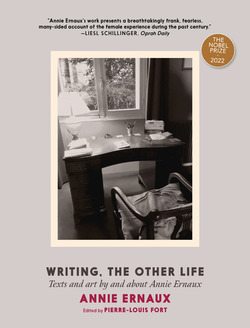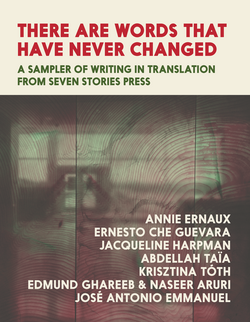“A Country for Dying is a knife of a novel—short, sharp, and jagged. Abdellah Taïa ruthlessly uses that knife to cut away sentimental notions of love, romance, family, and nation. He exposes how colonization has shaped sexual desire, expression, and exploitation, and leaves us with a memorable, powerful work.”
– Viet Thanh Nguyen, author of The Sympathizer and The Refugees
“Abdellah Taïa dramatizes the reality of Zahira and Zannouba, Moroccan prostitutes in Paris, at sea in the stormy straits between the sexes and nationalities, estranged from their families but absorbed by their loves and fantasies; this is a cri de coeur and a cri de corps, heart and body crying in the lonely city.”
– Edmund White
“Abdellah Taïa is one of the most original and necessary voices in world literature. ... With each novel Taïa grows as an artist and expands our knowledge of what it means to be an outsider inside the Muslim world.”
– David Ebershoff, author of The Danish Girl and The 19th Wife
“Taïa’s novels often feature a semi-autobiographical gay protagonist negotiating a sex life in a working-class Moroccan milieu. The novella-length “A Country for Dying” is quite different; out of a polyphonic onslaught, Taïa fashions a globe-trotting yet tenuous story.
The author, who grew up in Morocco and lives in France, excels when contrasting the dreams of two of his three main characters, all of whom are North African prostitutes, with the grimness of demimonde Paris. (Taïa writes in French; “A Country for Dying” was translated into appropriately gritty English by Ramadan.) Zahira, one of the protagonists, repeatedly witnesses her male Arab clients being “used by this city that mistreats them with no remorse, and by their white French bosses who exploit them under the table without a hint of guilt.” The other Parisian prostitute, Aziz, insists that he wants to “become the girl I had always been, long before I came into the world,” yet finds himself wrestling with the finality of gender reassignment surgery.
Taïa’s third main character is Zineb, Zahira’s paternal aunt, who strayed from her village in French-ruled Morocco as a teenager and was raped by a French police chief. Thus “dishonored,” she embarked on a life of prostitution. Zineb’s tale is set in 1950s French Indochina, where she tells a client about her fateful past as well as her piteous fantasy of becoming a film star in India. It jars with the stories of Zahira and Aziz, owing to its brevity and altogether different time and place. Nevertheless, Taïa adroitly conveys the sobering message that, whether in the mid-20th century or in the early 21st, sexual stigma is often irremovable, and can even foreclose the possibility of a return home.”
– Rayyan Al-Shawaf, The New York Times Book Review
“Immigrants in Paris seek political, economic, and sexual refuge in Taïa's heart-wrenching tale of postcolonial identity crisis. Zahira, a 45-year-old prostitute, is haunted by memories of her father's suicide in Morocco when she was a child, and of Allal, a possessive Moroccan who loved her decades earlier. In Paris, Zahira looks out for an Algerian protégé, Zannouba, on the eve of Zannouba's sex reassignment surgery, and Mojtaba, a gay Iranian dissident, whose innocence awakens Zahira's maternal instincts. For Zahira and others, solace eludes them in the form of lost or unrequited love, a theme Taïa distills in a nested story of Zahira's vanished aunt, Zineb. Enlisted by the French to service soldiers in 1950s Indochina, Zineb is left adrift between the family she's left behind and a love she can only sell. Taïa's blunt style is shot through with an immediacy accenting the high stakes for those chased across borders and running from their own pasts ("You thought you had fled our world," says Allal). But Zahira is not free, and Allal has not forgotten her; he is coming now to Paris, planning to kill her. In the churning gears of this compact, deeply moving novel, crises of identity prove more solvable than those of the heart.”
– Publishers Weekly (Starred Review)
“The Moroccan writer Abdellah Taïa’s novel A Country for Dying (translated from the French by Emma Ramadan) depicts a Paris distinct from the stuff of Anglophone fantasies. The story follows three characters: Zahira, a forty-year-old Moroccan sex worker in love with a man who does not return her feelings; Zahira’s friend Zannouba, who undergoes gender confirmation surgery and reflects on questions of trauma and identity; and Mojtaba, a gay Iranian revolutionary who by chance stays with Zahira for the month of Ramadan. Taïa, who came out as gay in Morocco—where homosexuality is illegal—in 2006, poignantly portrays the lives of immigrants in a city and country that is frequently hostile to them, and openly questions France’s perception of itself and its immigration policies.”
– Rhian Sasseen, The Paris Review
“A pocketable, one-sitting read, Abdellah Taïa’s "A Country for Dying" is an engrossing transcontinental and transgenerational fable sweeping from coastal Morocco to northern France over the course of five decades. With terse, biting prose beautifully translated from French by Emma Ramadan, it is a startlingly topical and succinct examination of race, relocation, isolation, and identity.”
– Logan Webb, World Literature Today
“Despite its brief length, Abdellah Taïa’s novel covers a lot of territory, both temporally and thematically. This is a work that concerns itself with intimacy, with desire, and with identity—and which finds multiple permutations of each to discuss. Throw in a plot that grapples with colonialism and generational trauma and you have a complex, thoughtful novel.”
– Tobias Carroll, Words Without Borders
“In this newly translated work of fiction, the Paris-based Moroccan writer and filmmaker looks at sexuality, desire, and identity in a post-colonial world... [In] these vignettes and monologues, Taïa offers American readers glimpses of lives few of us are likely to see outside of this book. Lyrical and impassioned.”
– Kirkus Reviews
“In his new novel, A Country for Dying, Abdellah Taïa explores the lives of migrants in Paris, offering an unusual and uncomfortably real perspective on what it is to exist between places. Cut off from their own countries yet marginalised by their new home, his characters live fragmented lives that often play out at night-time or in dark, shadowy spaces. Themes such as gender, sexuality, religion and identity are explored in some detail as well, making this brief work of fiction – published by Seven Stories Press in a seamless translation by Emma Ramadan – something deeply profound and complex.”
– The Monthly Booking
“I think anyone who likes Ocean Vuong’s work would also love reading this book. It’s about a prostitute and her son, a young gay Muslim who becomes a jihadi. There are multiple characters in this perpendicular narrative, such as a good friend of the prostitute who is going through a gender transition, and it’s a fascinating window into the lives of impoverished North Africans in Paris, dealing with the politics of their own identity and their sexual identity. The prostitute is in love with a man who’s no longer in love with her, and everything is kind of complicated and twisted. I like the fact that the novel bounces around narratively; it’s not a classic three-act structure, it’s more perpendicular and really gets inside the lives of these characters.
Whenever I go to Paris, I’d never normally meet people like the characters in A Country for Dying. I love how books give me a window into other people’s lives, especially those people whose paths I would not normally cross. If you look at my films, the vast majority of them are based on books. I find that if you write an original script, no matter how good it is, it just somehow doesn’t quite scratch beneath the surface enough in the way that a book does.”
– Wayne Wang, director of 'The Joy Luck Club' (1993) and 'Coming Home Again' (2020)
“A Country for Dying is filled with imaginary letters, dialogues, and soliloquies where Taïa completely foregoes dialogue tags. Some of the most beautiful moments here emerge when dialogue turns into all but a string of poetic lines, and it becomes pleasantly unclear who the speaker and addressee are. These instances embody the to-and-fro of Taïa’s style, where an adult is always one feeling away from becoming a child again. We may not know who’s speaking but we know something ancestral is being written, or rewritten, in a way that recalls the dialogic narration in Manoel de Oliveira’s Visit or Memories and Confessions...
The poetic register of A Country for Dying is wrought by an eventfulness triggered by the tiniest things that just keep on echoing generations later: a memory, a song, a stranger. In one particularly poignant, and ever so fleeting, sequence in the book, Zahira visits the Luxembourg Gardens in Paris for the first time late at night with Mojtaba, a wounded Iranian man she takes in for a month before he disappears. It’s almost closing time, but instead of leaving, Mojtaba tells her that they should stay to enjoy the gardens alone in the wee hours—and they do. “The French are gone,” he tells her. “The garden is ours.””
– Diego Semerene, Slant Magazine
“More Paris you say? "A Country for Dying" by Abdellah Taia is a swirling narrative with characters who struggle with loss – of a part of oneself, of homelands, and of love. Yet, even though all that, there can be hope.”
– Monica Carter, LGBTQ Writers in Schools Manager, Lambda Literary
“The novel’s writing style encourages the reader to engage with the text not on their own terms, but on the narrator’s; in other words, the author’s style itself is part of the author’s message. In “A Country for Dying,” there may be beauty, but it is an unforgiving beauty that does not soften or shy away from the realities of the queer experience. Positive, legible representation of queer and trans subjects isn’t always the best. There are some conversations that are not meant to be easily digestible for everyone, Taïa’s seems to tell us. Zannouba’s lived experience is not so easily universal nor clear just because it exists in the literature.”
– Chiara Naomi Kaufman, Contributing Writer, The Wesleyan Argus
“I read Abdellah Taïa’s A Country for Dying, a symphony of immigrant experiences in Paris, which revealed to me a gritty corner of the City of Lights I’d never seen.”
– Daniel Loedel, author of Hades, Argentina, The Millions
“Through swirling, perpendicular narratives, A Country for Dying follows the inner lives of emigrants as they contend with the space between their dreams and their realities, a schism of a postcolonial world where, as Taïa writes, “So many people find themselves in the same situation. It is our destiny: To pay with our bodies for other people’s future.””
– Entropy










